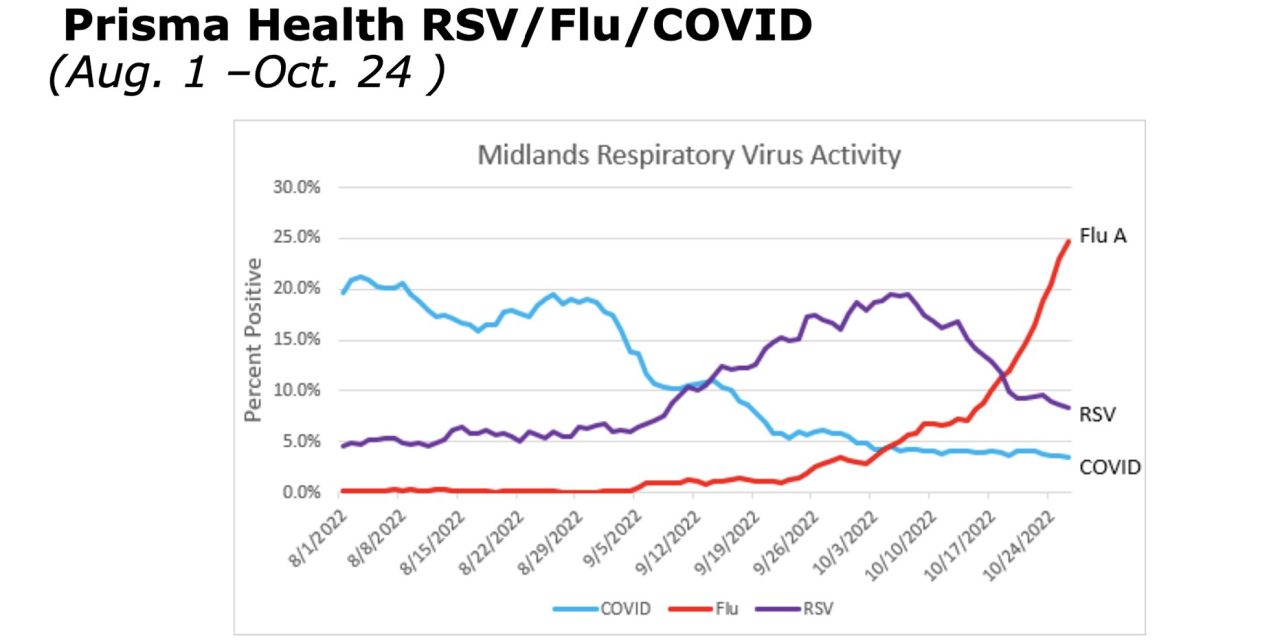The most recent data from Prisma Health comparing COVID, flu and RSV cases in the Midlands. (Graphic courtesy of Prisma Health)
The number of pediatric flu, COVID and RSV cases statewide in the Prisma hospital system is at an all-time high, according to Tammie Epps, the system’s director of social media and marketing.
The infections are stretching hospitals’ capacity not just in Columbia and Greenville, where Prisma is based, but across the South.
Hospitals in North Carolina, Georgia and eastern Tennessee are calling South Carolina, expressing a huge need for pediatric beds, according to Caughman Taylor, medical director at Prisma Health in Columbia.
The Southeast’s bed capacity has not expanded with the growth of the pediatric population, Taylor said.
“Children, for the most part, are very healthy and don’t require chronic hospitalizations,” Taylor said.
Prisma teams across the state are in constant communication about resources and bed capacity, health officials said.
With its Columbia ICU at near-capacity – with beds full or close-to-full — Prisma has implemented “surge beds” outside normal care areas to treat more patients.
Children at Prisma’s Children’s Hospital with less-severe symptoms are being evaluated and treated in a hospital lobby and then sent home with their families. Columbia also is sending overflow pediatric patients to its satellite location in Sumter.
At the same time, Prisma-affiliated primary care physicians are seeing patients as soon as possible — the same day or the next day. And virtual visits also have become popular during the surge.
“Hopefully, this will expand our ability to get more people in,” said physician Robin Lacroix, of Prisma’s Greenville Memorial Hospital.
Lacroix said Greenville is seeing the same influx in cases as the Midlands, with RSV dominating inpatient and outpatient treatment.
Prisma’s Greenville Memorial Hospital has seen rates of respiratory syncytial virus, or RSV, double since the end of September, Lacroix said. Positive cases are at about 8.7%, compared to 4% at the end of last month, according to data from Prisma Health.
Lacroix, a pediatric infectious disease specialist, said doctors also are seeing older children and adults over 65 with special health conditions, such as autoimmune disorders, being affected. RSV typically affects infants and toddlers, so this is new.
“We are working closely with emergency physicians in emergency care sites to determine what we need to do for children needing (broader) evaluations,” Lacroix said.
Lacroix said Prisma is addressing the increase in cases in the Upstate by leveraging the network of hospitals and other healthcare providers in the area. Prisma has two satellite hospital locations that serve the Greenville area that are staffed with pediatric specialists to help support children needing care.
Prisma health officials have seen RSV come in two waves of infection in previous seasons. They’re expecting that pattern to continue this year, with a second wave of infection in late winter or early spring. The two waves over the past two years have been shaped by masks and distancing, which altered patterns of virus circulation and immunity.
Taylor said the surge in Columbia is “tremendous,” and the convergence of cases of COVID, flu and RSV is unusual.
“Before, we saw it spaced out,” Taylor said.
Anna Kathryn Burch, a pediatric infectious disease specialist in Columbia, said the biggest worry right now is monitoring case numbers and watching for secondary bacterial pneumonia. Patients who recover from RSV are at a higher risk of contracting pneumonia while their immune system is compromised.
A secondary bacterial pneumonia will present itself in the form of a cough along with a high fever. Since pneumonia is an upper-respiratory infection, coughing fits along with difficulty breathing, rapid breathing, or shortness of breath are other common signs.
South Carolina on Monday reported its first pediatric death from the flu, in the Midlands. But state health officials didn’t provide more information.


